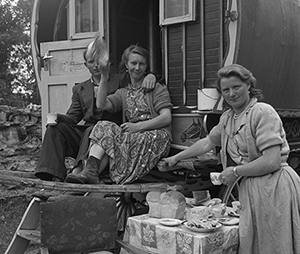Travellers and family history
Published in Features, Issue 3 (May/June 2018), Volume 26By Fiona Fitzsimons

Above: Tea time at a Traveller encampment c. 1954. Through an interdisciplinary study of medical genetics, family history and surnames, it should be possible to recover Traveller history in the century and a half before large-scale settlement in the 1950s. (NLI)
From the point of view of this writer, probably the most interesting research finding was the correlation between distinct ethnic groups and cultural practises—whether Gammon- or Cant-speakers, or members of the Rathkeale group. Once you begin to tease out the implications, it raises even more questions. We are left with the puzzle of how to begin to describe who Irish Travellers are, when before 1950 there is a lack of documentary evidence. Family history can step into the breach. It’s a robust methodology in which every fact or statement is corroborated by comparing one document against another, to prove a connection or relationship.
Better on-line access to the records means that we can trace almost every Irish family back to the 1820s. Researchers should start with the ‘catch-all’ sources that include Irish people of all ages, faiths and backgrounds: parish registers; the census; petty sessions courts; newspapers; and civil records—births, marriages and deaths are now searchable by father’s occupation/mother’s maiden name/or place of birth, on Findmypast.
Even when we are familiar with sources that don’t require much interpretation, finding Irish Travellers requires some lateral thinking. The 1901 and 1911 censuses record Travellers but not as an ethnic group, nor by their language of Shelta or its dialects. In the census we find Travellers living on the side of the road; these are clearly identifiable. Less visible are those Travellers recorded as boarders and lodgers, named as proprietors of houses and smallholdings, as soldiers in army barracks, patients in hospitals or inmates in workhouses and prisons. In some instances we can use specific occupations to define a cohort: tin-smithing is a traditional occupation, for example. In 1901 we find 13,200 tin-smiths/tin-men/tinkers, etc.
Where we are searching for a known family name, we can cross-reference against an occupation to deduce whether we have the correct family—Berry/horse-dealers, Gammell/pedlars—but many traditional occupations (seasonal labourer or farmer) can obscure Traveller origins where there is no other corroborative evidence. We find three generations of the extended McDonagh family in the townland of Knockarasser, Co. Galway. Are they country people, settled Travellers or a Traveller family in temporary accommodation over winter? To overcome these problems, research should be Traveller-led and should include a dedicated surname project.
The gold-standard research project to document Irish Travellers would be an interdisciplinary study of medical genetics, family history and surnames. We might then recover Traveller history in the century and a half before large-scale settlement from the 1950s.
Fiona Fitzsimons is a director of Eneclann, a Trinity campus company, and of findmypast Ireland.
















